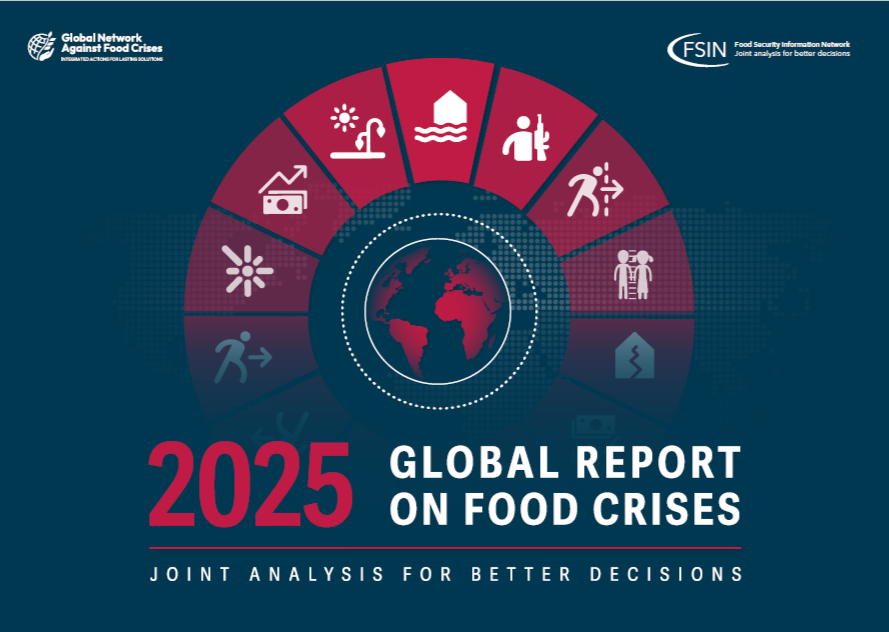The Global Report on Food Crises (GRFC) 2025 shows conflict, economic shocks, climate extremes and forced displacement continued to drive food insecurity and malnutrition around the world, with a catastrophic impact on many already fragile regions. In 2024, more than 295 million people across 53 countries and territories experienced acute levels of hunger – an increase of 13.7 million from 2023.
The Global Report on Food Crises (GRFC) provides in-depth analysis of food and nutrition crises at the global, regional and country level. It examines acute food security and malnutrition among resident and forcibly displaced populations, presents the immediate and underlying drivers of food and nutrition crises, and analyses nine years of acute food insecurity trends. It advocates for timely responses and offers insights into immediate and medium-term risks to vulnerable populations.
The GRFC results from a collaborative effort among United Nations agencies, regional intergovernmental bodies, donors, technical organisations and clusters, working together to deliver consensus-based analysis that guides effective humanitarian and development interventions. Its production is coordinated by the Food Security Information Network (FSIN) in support of the Global Network Against Food Crises (GNAFC).
The report’s foreword from António Guterres, UN Secretary-General
“This Global Report on Food Crises is another unflinching indictment of a world dangerously off course.
Hunger is not an emergency confined to certain pockets of the world or periods of time. It is fast becoming a scar etched into the lives of millions around the globe. Fueled by conflict, geopolitical tensions, climate chaos, environmental vulnerabilities, and economic upheaval, food and nutrition crises define the lives of millions– not for weeks or months, but for years and even lifetimes.
As detailed in this report, more than 295 million people faced acute hunger last year, the sixth consecutive annual increase. From Gaza and Sudan, to Yemen and Mali, catastrophic hunger driven by conflict and other factors is hitting record highs, pushing households to the edge of starvation. Displacement has also surged, as violence and disasters rip families from their homes and condemn people of all ages to malnutrition and even death. Meanwhile climate extremes are growing in intensity – wreaking havoc on global food security, crippling harvests, and breaking supply chains.
The message is stark. Hunger and malnutrition are spreading faster than our ability to respond, yet globally, a third of all food produced is lost or wasted. Long-standing crises are now being compounded by another, more recent one: the dramatic reduction in lifesaving humanitarian funding to respond to these needs. This is more than a failure of systems – it is a failure of humanity. Hunger in the 21st century is indefensible. We cannot respond to empty stomachs with empty hands and turned backs.
Governments, businesses and decision-makers must heed the clear warnings issued in this report. We must summon the funding, innovations and global solidarity to build the food-secure and climate-resilient future that every person, everywhere, needs and deserves. Trade must become a driver of food security – not a barrier to it. We need fair, transparent, and resilient trade systems that ensure food can move efficiently, especially during crises. The UN Pact for the Future, adopted in September 2024, gives renewed momentum to the fight against hunger by helping to build more resilient, inclusive, and sustainable food systems for all.
We can meet the great promise of ending hunger if we commit to change, choose to act, and forge a different, more humane path.”

